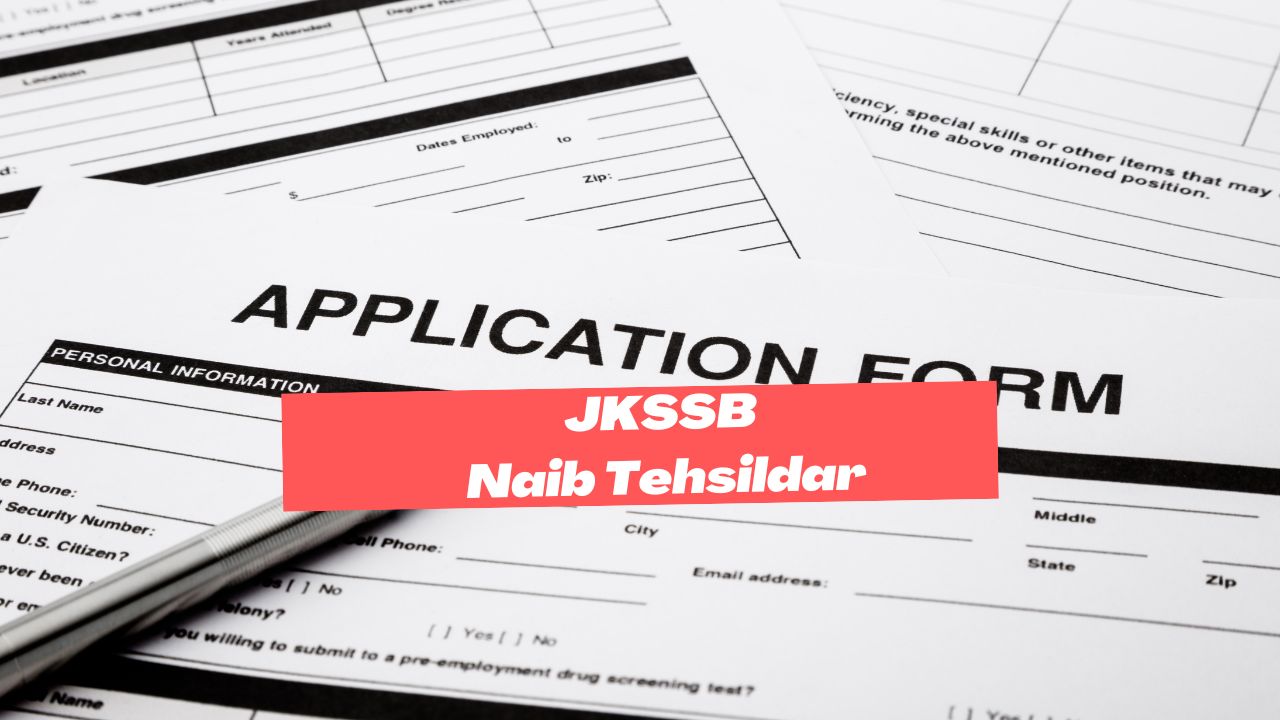The recent recruitment notification by the Jammu and Kashmir Services Selection Board (JKSSB) for 75 Naib Tehsildar posts in the Revenue Department has stirred widespread controversy. Aspirants and political leaders from the Jammu region have voiced strong concerns over two major issues—the mandatory Urdu language requirement and limited reservation for the general category. These developments have reignited the long-standing debate around regional discrimination and biased selection practices in the union territory’s recruitment process.
Urdu Language Requirement Under Scrutiny for Naib Tehsildar Recruitment
Compulsory Urdu Test Reintroduced
The JKSSB notification dated June 9, 2025 (Advertisement No. 05 of 2025) states that candidates applying for Naib Tehsildar posts must possess working knowledge of Urdu. The syllabus includes two papers—one in English (MCQ-based) and another Urdu descriptive paper as a qualifying component.
For Complete Details and Notification : Click here
- Open Merit candidates must score at least 40% in the Urdu paper.
- Reserved category candidates must secure a minimum of 35%, with at least 33% in both reading and writing sections.
The Urdu paper consists of:
- Comprehension-based questions,
- Letter writing (minimum 100 words),
- Translation (English to Urdu or vice versa),
- A short essay on a socially relevant topic.
Historical Context: 2019 Disqualification Controversy
The language requirement is not new. In 2019, when a similar test was introduced, 122 out of 126 disqualified candidates were from the Jammu region due to their failure to clear the Urdu test. Despite scoring high in the written exam, these aspirants were barred from attending the final interview, prompting backlash across civil society and political circles.
Allegations of Regional Discrimination
Bias Against Jammu Candidates?
Critics argue that the imposition of the Urdu test appears to be a systematic attempt to sideline Jammu-based aspirants, most of whom are not proficient in Urdu. Although Dogri, Hindi, Kashmiri, English, and Urdu are all official languages of Jammu & Kashmir, Urdu continues to be enforced in specific departments like Revenue.
Many question the rationale, pointing out that most official documents—including FIRs and revenue records—are maintained in English. This has led to widespread calls for re-evaluating the language mandate, especially for technical and administrative posts.
Political Leaders Voice Concerns
Vikram Randhawa and Sajjad Lone React
Prominent political figures have criticized the recruitment guidelines:
- BJP MLA Vikram Randhawa labeled the Urdu requirement a “conspiracy to block Jammu youth from securing government jobs.”
- People’s Conference Chairman Sajjad Gani Lone criticized the selective reservation policy, highlighting that only 40% of the posts are allotted to the general category, despite ongoing efforts by the government to rationalize the reservation system.
Disparity in Reservation: General Category Candidates Affected
30–40% Posts Reserved for General Category
Out of 75 advertised posts, only 30 are marked for the general category, intensifying resentment among general-category aspirants. The situation is further aggravated by the absence of interviews, making the written exam and Urdu test the sole criteria for selection.
Aspirants argue that this limited representation—combined with a language barrier—is an unjust double blow for Jammu youth.
Past Precedents and Unfulfilled Promises
2009 Recruitment Irregularities Revisited
A similar issue occurred in 2009, when 29 Jammu-based candidates were denied appointments because their matriculation certificates did not mention Urdu, even though the original advertisement had no such eligibility requirement.
Though the matter was resolved after the intervention of then Revenue Minister Raman Bhalla, those affected lost their right to the Old Pension Scheme and joined services later than their peers—putting them at a professional disadvantage.
Aspirants Demand Intervention
Call for Lt. Governor’s Involvement
Aspirants have appealed to Lt. Governor Manoj Sinha for intervention, urging the government to:
- Remove or reconsider the Urdu language mandate,
- Allow selected candidates to acquire working Urdu knowledge during training, similar to IAS and JKAS officers,
- Ensure equal opportunities for all regions and categories.
They stress that the selection process should prioritize merit and administrative capability, not linguistic background.
BJP Leaders Link Language Requirement to Demographic Politics
Allegations of Community-Based Bias
According to BJP leader Advocate Ankur Sharma, the insistence on Urdu plays into what he calls a broader agenda of “land jihad” and demographic control through selective recruitment. He believes the dominance of a particular community in Urdu is being used as a tool to marginalize others—particularly the youth from Jammu.
The JKSSB’s 2025 recruitment notification for Naib Tehsildars has become more than just a hiring process—it’s now a flashpoint for broader issues of regional equality, linguistic neutrality, and transparent governance. The backlash reveals deep-seated grievances and a growing demand for fair, inclusive, and language-neutral recruitment practices in Jammu and Kashmir.
For now, aspirants and stakeholders await clarity, hoping that the administration acts in the spirit of justice and equality to prevent the repetition of past mistakes and restore faith in the public selection system.

















